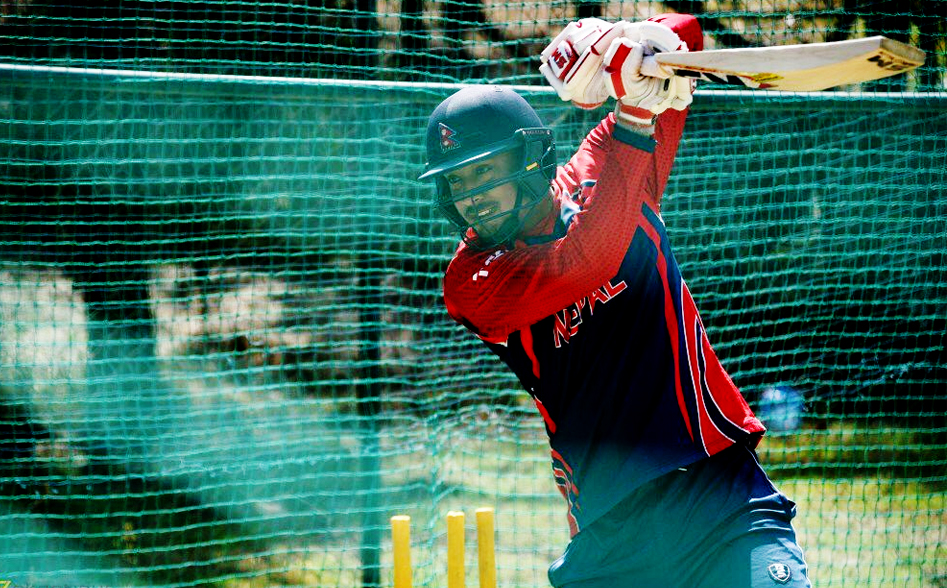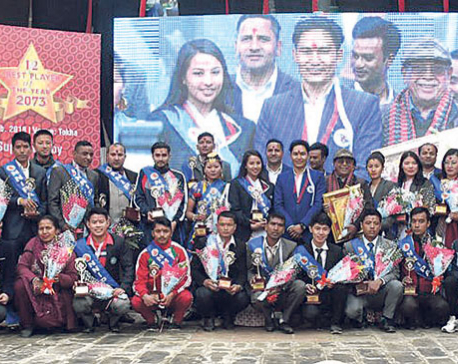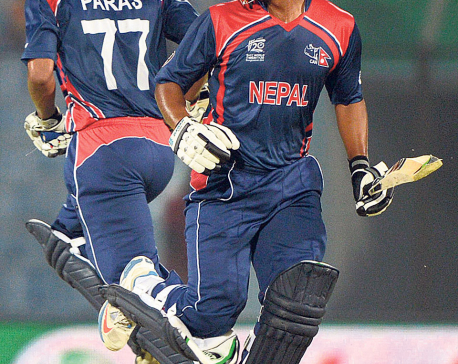
OR
ICC picks Paras Khadka as best performer
Published On: March 13, 2018 05:31 PM NPT

KATHMANDU, Mar 13: International Cricket Council (ICC) has picked Paras Khadka, captain of Nepali Cricket team as one of the best performers in a batting order of sorts from the 20 games in the tournament out of the 11 best performers from the first round of matches at the ICC Cricket World Cup Qualifier 2018.
Ten teams and ten sets of players participated into the ICC Cricket World Cup Qualifier 2018 with the same dream, to be among the top two teams and get into the ICC Cricket World Cup 2019.
With the group stage of matches over, and four teams falling by the wayside in the process, the stage is set for the six best teams to thrash it out over the next few days, four more to be eliminated, and those two teams to be spotted.
Here’s a look at 11 of the best performers from the 20 games.
William Porterfield (Ireland)
The 33-year-old Ireland captain has been a part of pretty much everything Ireland has done on a cricket field over the past decade or so, and he is still out there, fronting the team’s dash towards one more World Cup appearance. And he has been in great nick, starting out with a 47 against the Netherlands, then scoring a century (111) in the win over PNG, and finally, after a duck against Windies, getting another big one (92) in the massive win over UAE to tally 250 runs so far.
Tony Ura (Papua New Guinea)
After missing the opener against UAE, the PNG opener made his mark in the second game, when he made a blistering 151 against Ireland. That’s 64.26 percent of his team’s runs (235). Though his century was in a losing cause, Ura’s ton won him the Player of the Match award. He failed to deliver in the next two, making 37 and 3 against Windies and the Netherlands, but talk about making a mark, and Ura certainly did that.
Calum MacLeod (Scotland)
The Scotland top-order batsman has had three failures, but his 157* against Afghanistan in Scotland's first game has been one of the highlights of the tournament. It was the second-highest individual score ever for Scotland – his 175 against Canada in 2014 being the highest – and it gave him three of his country’s top four 50-over scores of all time. Against Afghanistan, he faced 146 balls, hitting 23 fours and a six, and also forged a 208-run third-wicket stand with Richie Berrington, which is a national record for any wicket.
Brendan Taylor (Zimbabwe)
Taylor has been in tremendous form with the bat. In the first match against Nepal, he made a blistering 100 off 91 deliveries with seven fours and a six. In the next game against the pre-tournament favorites Afghanistan, he fell 11 runs short of another century, making 89 in 88 balls. Zimbabwe’s third game was against Hong Kong, and Taylor delivered again with a 51-ball 46, while in the tie against Scotland, he made a 54-ball 44. That’s 279 runs in total.
Paras Khadka (Nepal)
He is Nepal’s most loved cricketer and he has lived up to his reputation for years. If you’re looking for consistency in a line-up that hasn’t always been able to deliver, how about 40 against Zimbabwe, 63 against Scotland and 75 against Afghanistan, all teams with strong bowling attacks. He failed to go against Hong Kong in the last game, scoring only 11, but amazingly that’s the one Nepal won.
Anshuman Rath (Hong Kong)
After falling for a duck in Hong Kong’s first match Scotland, Rath made a strong comeback against Afghanistan. He scored a match-defining 65, helping his side win the match by 30 runs on the DLS method. After that, he top scored with a 117-ball 85 against Zimbabwe, one of the best innings in the tournament, before failing in his last game.
Sikandar Raza (Zimbabwe)
The Zimbabwe all-rounder set the tournament alight on the first day itself, scoring 123 and then returning 3/48 as Zimbabwe beat Nepal by 116 runs. He was in good nick against Afghanistan too, scoring a measured 68-ball 60 and picking up 3/40, and while he has failed with the bat since then, there has been another three-for, 3/30, against Hong Kong, making him one of the top two all-rounders in the competition.
Rohan Mustafa (UAE)
Another captain who led from the front, Mustafa started in blazing form, scoring a 136-ball 95 in the opening encounter against PNG to lead his side to victory. That inning was Mustafa’s second best in ODI cricket. In the next three matches, he failed to go big with the bat but did brilliantly to return 5/26 with his off-spin in the six-wicket win over the Netherlands.
Mohammad Nabi (Afghanistan)
The all-rounder has been around forever, and it’s difficult to remember if he has ever had a bad patch. Not in the qualifiers, certainly. How about 92, 51, 38 and 34 with the bat and eight wickets along the way? Against Nepal, in the last league match where Afghanistan’s hopes were hanging by a thread, Nabi first returned 4/33 and then scored 34, helping his side qualify for the Super Sixes.
Jason Holder (Windies)
Holder is the other all-rounder making a big difference while taking care of the small matter of leading Windies to four wins in four games. He decided to step back in the last game, against the Netherlands, but before that he played starring roles in each of Windies’ wins – 5/53 against UAE, 99* against PNG, and against Ireland, 54 with the bat and 2/49 with the ball.
Ehsan Khan (Hong Kong)
Another Hong Kong player that left his mark was Ehsan Khan. The off-spinner picked up wickets in all the league matches: 3/29 against Scotland, 4/33 against Afghanistan, 2/51 against Zimbabwe and 2/34 against Nepal. The 11 wickets put him right on top of the wicket-takers’ chart at the moment.
Source: International Cricket Council.
You May Like This

Paras Khadka announced Best Cricketer of the Year
KATHMANDU, Feb 13: The national cricket team captain Paras Khadka has been announced as the Best Cricketer of 2017, at an... Read More...

Paras Khadka, former captains felicitated
KATHMANDU, May 27: All the former and the present captain of the Nepal national cricket team were felicitated by the... Read More...

Paras Khadka, Gyanendra Malla to miss PM Cup
KATHMANDU, May 26: National cricket team captain Paras Khadka, who also heads the Armed Police Force team, is likely to miss... Read More...




Just In
- Govt receives 1,658 proposals for startup loans; Minimum of 50 points required for eligibility
- Unified Socialist leader Sodari appointed Sudurpaschim CM
- One Nepali dies in UAE flood
- Madhesh Province CM Yadav expands cabinet
- 12-hour OPD service at Damauli Hospital from Thursday
- Lawmaker Dr Sharma provides Rs 2 million to children's hospital
- BFIs' lending to private sector increases by only 4.3 percent to Rs 5.087 trillion in first eight months of current FY
- NEPSE nosedives 19.56 points; daily turnover falls to Rs 2.09 billion















Leave A Comment